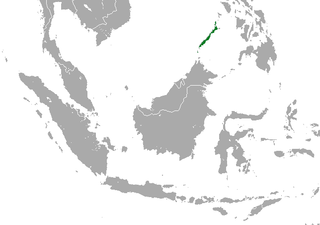
The lesser white-toothed shrew is a tiny shrew with a widespread distribution in Africa, Asia and Europe. Its preferred habitat is scrub and gardens and it feeds on insects, arachnids, worms, gastropods, newts and small rodents, though its diet usually varies according to the biotope where it lives. The closely related Asian lesser white-toothed shrew was once included in this species, but is now considered to be a separate species.

The Cyrenaica shrew or Alexander's shrew is a species of white-toothed shrew in the family Soricidae which is endemic to Libya.

The Asian gray shrew is a species of mammal in the family Soricidae. It is found in Bhutan, Cambodia, China, India, Laos, Malaysia, Myanmar, Nepal, Pakistan, the Philippines, Thailand, and Vietnam. It is one of the commonest species within its range and the International Union for Conservation of Nature has assessed its conservation status as being of "least concern".

Bottego's shrew is a species of mammal in the family Soricidae. It is found 1,750 metres (5,740 ft) above sea level in Ethiopia and possibly Kenya particularly northeast of Lake Turkana and one in Kenya from Marsabit.

The Sulawesi shrew is a species of mammal in the family Soricidae. It is endemic to the central and northern provinces of Sulawesi in Indonesia. It is a fairly common species and the International Union for Conservation of Nature has assessed its conservation status as being of "least concern".

The Sunda shrew is a species of mammal in the family Soricidae found in Indonesia and Malaysia.

The black-footed shrew is a species of mammal in the family Soricidae. It is endemic to northern and central Sulawesi, Indonesia where it lives on the floor of the tropical forests. The International Union for Conservation of Nature has assessed its conservation status as being of "least concern".

The Palawan shrew is a species of mammal in the family Soricidae. It is endemic to the Philippines and known from Palawan and Balabac Islands, from sea level to 1,300 m (4,300 ft) asl. It occurs in old growth and scrubby secondary forest.

Fraser's musk shrew is a species of mammal in the family Soricidae. It is found in Benin, Cameroon, Ivory Coast, Equatorial Guinea, Ghana, Guinea, Liberia, Nigeria, São Tomé and Príncipe, Sierra Leone, and Togo. Its natural habitat is subtropical or tropical moist lowland forests. This large black shrew was first described by the British zoologist Louis Fraser in 1843. Its exact definition is unclear; the karyotype comes from Ivory Coast but not from Equatorial Guinea, which is given as the type locality.

The Sulawesi white-handed shrew or Temboan shrew is a species of mammal in the family Soricidae. It is endemic to the island of Sulawesi in Indonesia. It is a fairly common species and the population seems stable so the International Union for Conservation of Nature has assessed its conservation status as being of "least concern".

The Sicilian shrew is a species of mammal in the family Soricidae. It is found in Sicily (Italy) and Gozo (Malta). Its natural habitat is temperate shrubland.

Whitaker's shrew is a species of mammal in the family Soricidae. It is found in Western Sahara, Algeria, Morocco, Tunisia. Its natural habitats are subtropical or tropical dry shrubland, rocky and sandy coasts. It is a fairly common species and the International Union for Conservation of Nature has rated its conservation status as being of "least concern".

The Christmas Island shrew, also known as the Christmas Island musk-shrew is an extremely rare or possibly extinct shrew from Christmas Island. It was variously placed as subspecies of the Asian gray shrew or the Southeast Asian shrew, but morphological differences and the large distance between the species indicate that it is an entirely distinct species.

The Kinabalu shrew is a species in the family Soricidae. It is endemic to the mountain Mount Kinabalu on Borneo, and its sister peak, Mount Tambuyukon.

The Bornean shrew is a species of mammal in the family Soricidae. It is found only on Borneo, throughout most of the island; it may or may not be present in Brunei.

The Negev shrew, also known as the Ramon's shrew is a species of mammal in the family Soricidae. So far, it is only known from Israel. It is found in three regions: Mizpe Ramon and Sede Boqer in the Negev Desert, and Sartaber at the northern edge of the Judean Desert. It is likely that the species occurs more widely in the region than currently known. The three locations in which the species occur are rocky desert areas at altitudes between 200 and 950 metres above sea level. The Negev shrew is light gray with a slightly lighter underpart. It is also relatively small.
The Hainan Island shrew is a species of mammal in the family Soricidae native to China and Vietnam. The IUCN has insufficient data to assess the level of population and its trend.

Crocidura sapaensis is a species of white-toothed shrew native to northern Vietnam. It was first described in 2013 and its specific name derives from the Sa Pa where it was discovered.
Gathorne's shrew or Gathorne's white-toothed shrew is a species of mammal in the family Soricidae. It is endemic to northern India.
Sokolov's shrew is a species of mammal in the family Soricidae. It is endemic to Vietnam.


















